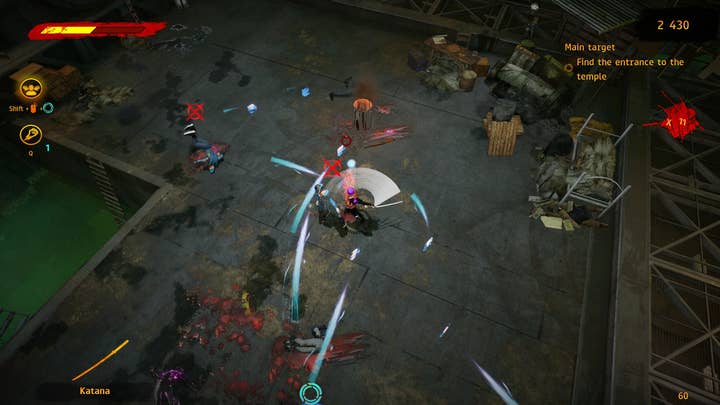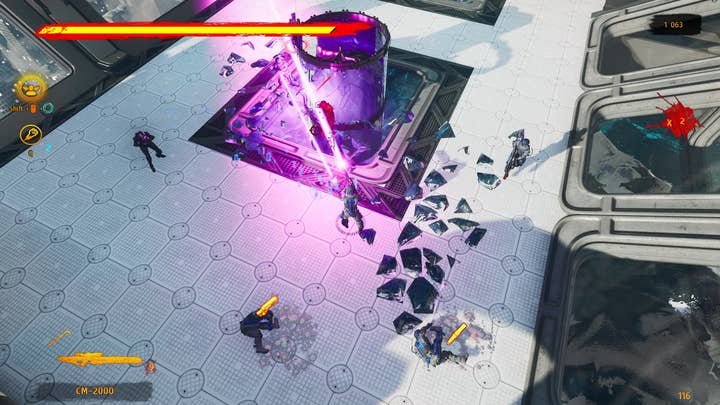Magic Hazard's Journey: Bringing a story-driven shooter to life with Xsolla Accelerator
Studio founder and CEO Sergei Kuznetsov talks to us about the challenges of making a story-driven top-down shooter
With more games in the market than ever, it’s important to bring new ideas to stand out. That’s something Magic Hazard has at its core for its debut game Memory Lost.
Set in the dystopian cyberpunk-inspired metropolis of Detraxis, it’s a top-down action shooter where you play as an AI, the Neural Network, implanted into the body of an assassin robot who’s fighting for their freedom and destiny. What makes it unique from other games in the genre is that you can change how you play by capturing the memories of your enemies and gaining their abilities. This results in diverse and adaptable gameplay where over time players can master a wide range of mechanics without the need to create and level up a new character repeatedly.
Speaking to studio founder and CEO Sergei Kuznetsov, the idea came one cold February morning as he and a few friends sat around a kitchen table talking about the types of games they enjoyed playing from their childhood, and what they felt was missing.
“After five hours of discussions, we all agreed: since childhood, we've wanted to play as the enemies we fight against. Not just outwardly, but inwardly as well - using their weapons and abilities,” says Kuznetsov.
While some games like Halo allow players to acquire enemy weapons, these inexperienced but passionate young developers wanted to take the idea further by actually shifting and taking over a defeated enemy’s body, claiming their abilities for yourself.
_lqkPxkO.jpg?width=720&quality=70&format=jpg&auto=webp)
“You can find different types of enemies, providing new possibilities to control them,” he explains. That’s not just limited to weapon types but also different playstyles. “You can decide to capture someone who's got a melee ability, and you can upgrade your skill to improve your melee.”
But Kuznetsov was also interested in not just the mechanical possibilities but what this meant narratively. “If you inhabit an enemy's body, you copy his life. You travel in his skin, encounter his environment, and see significant memories,” he explains. “Will this make you view the enemy differently? Possibly. Maybe not sympathize, but at least understand the motivation.”
Of course, the game has also been balanced to ensure players are always adapting. “Our game designer did a lot of work to balance everything,” Kuznetsov explains. “So if you use up all your ammo and can't use your gun, you will need to find a new enemy to mind-capture.” You can even shift to a larger enemy who has more maximum health with strong melee, though they’re also slower moving, and as they’re a rarer enemy type it’s not easy to capture another replacement if you decide to shift to another body.
"We spent around two years only developing four hours of gameplay.”
To avoid combat from becoming stale and monotonous, players are also constantly supplied with new variables, from new environmental hazards to avoid or use against the enemy, to new enemy types, which of course the transference mechanic also allows for new playstyles.
Development of Memory Lost began in 2020, starting with just five people - a programmer, a game designer, two novice 3D artists, and a novice 2D artist. “For the first five months, we brainstormed ideas, created a general concept, and studied the new field for ourselves,” says Kuznetsov.
More members gradually joined the project after that, including a few members from another studio whose prototype had fallen apart, eventually reaching 19 people. But while Magic Hazard was fueled by the passion for the concept, this was still a young and inexperienced team trying to figure out how to take Memory Lost to the next level, while Kuznetsov took on another job and other weekend side gigs to fund the team.
After a year of work, they presented the prototype to a panel of experts at DevGamm, consisting of representatives from publishers and marketing. Kuznetsov recalls it had been a brutal baptism of fire in terms of criticism but that when he followed up with emails he also received generous and detailed constructive feedback. Just some of the points raised included the lack of clarity when using the transference mechanics, a lack of variety in enemies and skills, flat level design, as well as a need to improve animation and visual impact.
“We went point by point to improve the game, reworking from scratch for half a year, and then presented it to them again,” he says. Comparing the initial build to how it is now, there’s also a clearer structure in how the combat and challenge evolves as players progress. For instance, Kuznetsov describes the initial chapters as having the following combat cycle:
1. Training - one enemy spawns at a time, a warm-up for introducing you to the flow.
2. Omnipotence - increasing enemy count, but which you’ll also have the necessary variety of firearms and mechanical mastery to handle, as players have a feeling of superiority and full control.
3. Challenge - quicker and larger enemy spawns with mixed weaponry, which pushes the player to master the mechanics in order to progress.
All that concludes with spaces afterward for players to take a break and explore the environments, giving them the time to resupply themselves but also discover bits of narrative in the world.

As development continued, it was also becoming clear that Magic Hazard would need more assistance to get Memory Lost to the shape it needed to become competitive. “With no experience, you try to do something good but don't understand the amount of resources you need to do it,” Kuznetsov says, citing that deciding to make a narrative-driven game with entirely hand-crafted levels and an aim of providing six hours of gameplay added to the difficulty of development.
“A lot of games like roguelikes, you can create half an hour or an hour of gameplay, focusing on smaller pieces of assets but provide infinite ways to play,” he explains. “But if you choose storytelling, the things that you have to do are a lot more. We spent around two years only developing four hours of gameplay.”
But inspired by campaign-led games from the 1990s and early 2000s, this was something the team wanted to concentrate on, with more than 90,000 words of text capturing the team’s love of dark humour. That narrative isn’t just delivered from lore drops in the environment but also through dialogue, as your heroine, the Neural Network, is accompanied by two observers, MARK (Mobile Assistant of the Corporation Worker), a kind of mentor and colleague coexisting inside the same body, and the Liaison, a representative from the corporation Redsky who also created you. How you engage with NPCs, such as killing, sparing or ignoring them, can also affect the narrative, with multiple endings to unlock, making Memory Lost not just a one-and-done experience.
The external lifeline Magic Hazard needed came from Xsolla, which Kuznetsov had already been acquainted with after a meeting in late 2021. Fortunately, the company announced plans to launch Accelerator the following year and was looking for developers with interesting game ideas. After submitting its latest demo build, the studio successfully joined the programme.
"Now I understand how to prepare beautiful presentations with gifs or videos that help people looking at your pitch"
A major incentive for Kuznetsov was that Accelerator provided financial aid. While the team had been scraping by funding themselves for two years, the additional funding would be able make the overall package more appealing, such as more animated cutscenes and voice acting, which are important elements for an immersive story-driven game.
Being on the year-long programme also provided the team with lectures and mentorship, which really helped in all facets of improving Magic Hazard as a game business. “You have consultation hours where you can ask help from specialists in any area, from game design, to marketing, to publishing, and they’ll try to find a specialist to provide services to you,” says Kuznetsov.
One of the most important things he learned might also be typical for inexperienced game developers. You may have a good idea but you need to know how to sell it to your audience. In the very first instance, this meant how to effectively pitch the game to investors and publishers. “My pitches before were basically Google Docs,” he laughs. “Now I understand how to prepare beautiful presentations with gifs or videos that help people looking at your pitch understand the possibilities and features of our game.”
While the extra guidance and resources led to new features could also be implemented in the game, it also meant improving the beginning in terms of onboarding and teaching players the mechanics. An even better way to introduce Memory Lost was the decision to release a free Steam demo, subtitled Chapter One and including the first two levels, which received more than 90% positive feedback. “It’s actually less than 200 reviews,” Kuznetsov admits. “But after feedback from Accelerator and other experts helped us to improve the game, we’re really happy to receive that feedback.”
Magic Hazard is now collaborating with ESDigital who will be publishing Memory Lost later in 2024. “Of course, you just click a button and you can publish on Steam, but without a publisher, it's easy to release a game and no one will know about it. So I really hope the publisher will help us deliver information about our game to a lot of players around the world.” The publisher is also helping port the game to multiple platforms as well as with localisation and QA to ensure Memory Lost is in the best shape to reach as many players as possible.
There were still many other great ideas from Accelerator that Kuznetsov says the team wasn’t able to implement due to time, though he’s hopeful they will be considered in Magic Hazard’s future games. That’s a promising sign for a studio’s future prospects, which is apt as Accelerator isn’t just there to help a studio with one game but to ensure they can thrive as a business.
You can wishlist Memory Lost on Steam now and also download the free demo.
